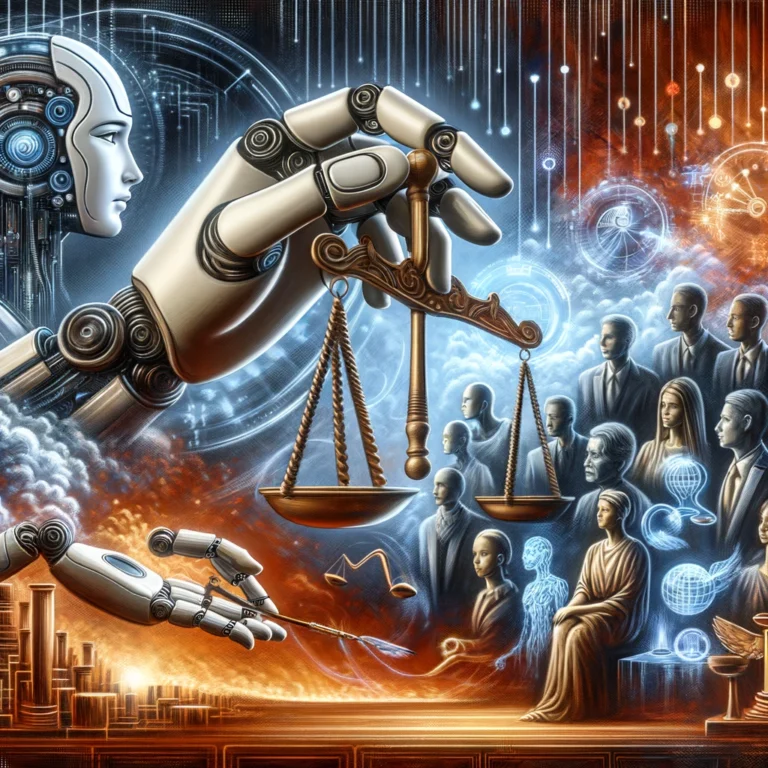Artificial intelligence (AI) has become an integral part of our daily lives, influencing everything from healthcare and finance to transportation and entertainment. While AI’s potential to drive innovation and efficiency is undeniable, it also raises significant ethical concerns. This article explores the ethical implications of AI, emphasizing the need to balance technological advancement with responsible and fair practices.
The Promise of AI
1. Transforming Industries
AI has the potential to revolutionize various industries by automating routine tasks, enhancing decision-making, and providing predictive insights. In healthcare, AI algorithms can analyze vast amounts of data to diagnose diseases early and personalize treatment plans. In finance, AI can detect fraudulent activities and optimize investment strategies. These advancements promise to improve efficiency, accuracy, and outcomes across sectors.
2. Enhancing Everyday Life
AI-powered applications, such as virtual assistants, recommendation systems, and smart home devices, have made everyday tasks more convenient. These technologies learn from user behavior to provide personalized experiences, saving time and effort. For instance, AI can recommend products based on browsing history or optimize energy consumption in smart homes.
Ethical Concerns
1. Bias and Discrimination
One of the most pressing ethical issues with AI is bias. AI systems are trained on large datasets, which can contain historical biases. If these biases are not identified and corrected, AI can perpetuate and even exacerbate discrimination. For example, biased algorithms in hiring processes can unfairly disadvantage certain demographic groups. Ensuring that AI systems are fair and unbiased requires meticulous data curation and ongoing monitoring.
2. Privacy and Surveillance
AI’s ability to process and analyze vast amounts of data raises significant privacy concerns. Facial recognition technology, for example, can be used for surveillance, potentially infringing on individual privacy rights. The misuse of personal data by AI systems can lead to unauthorized tracking, data breaches, and loss of anonymity. Developing robust privacy regulations and ethical guidelines is crucial to protect individuals’ rights.
3. Accountability and Transparency
AI systems often operate as “black boxes,” making decisions that are not easily understandable by humans. This lack of transparency can be problematic, especially in critical areas like criminal justice, where AI algorithms might influence sentencing decisions. Ensuring accountability in AI systems involves making their decision-making processes more transparent and understandable, enabling humans to oversee and challenge AI-driven outcomes.
4. Job Displacement
The automation of tasks through AI can lead to job displacement, particularly in industries reliant on routine manual labor. While AI can create new job opportunities, there is a risk that the transition will disproportionately affect low-skilled workers. Addressing this issue requires policies that support workforce retraining and education, helping workers adapt to the changing job market.
Balancing Innovation and Responsibility
1. Ethical AI Development
Developers and researchers must prioritize ethical considerations in AI development. This includes ensuring diverse and representative datasets, conducting regular bias assessments, and implementing fairness constraints. Ethical AI development also involves engaging with interdisciplinary experts, including ethicists, sociologists, and legal scholars, to address complex moral questions.
2. Regulatory Frameworks
Governments and international bodies need to establish comprehensive regulatory frameworks that govern AI use. These frameworks should address data privacy, algorithmic transparency, and accountability. By setting clear standards and guidelines, regulatory frameworks can ensure that AI technologies are developed and deployed responsibly.
3. Public Awareness and Engagement
Raising public awareness about the implications of AI is essential. Educating the public about how AI works, its benefits, and its risks can foster informed discussions and enable citizens to advocate for responsible AI practices. Public engagement can also help ensure that AI development aligns with societal values and needs.
Artificial intelligence holds immense potential to drive progress and innovation across various domains. However, it also poses significant ethical challenges that must be addressed to ensure that its benefits are realized fairly and responsibly. By prioritizing ethical considerations in AI development, establishing robust regulatory frameworks, and fostering public awareness, we can strike a balance between technological advancement and ethical responsibility. As AI continues to evolve, it is crucial to remain vigilant and proactive in addressing its ethical implications, ensuring that this powerful technology serves the greater good.

